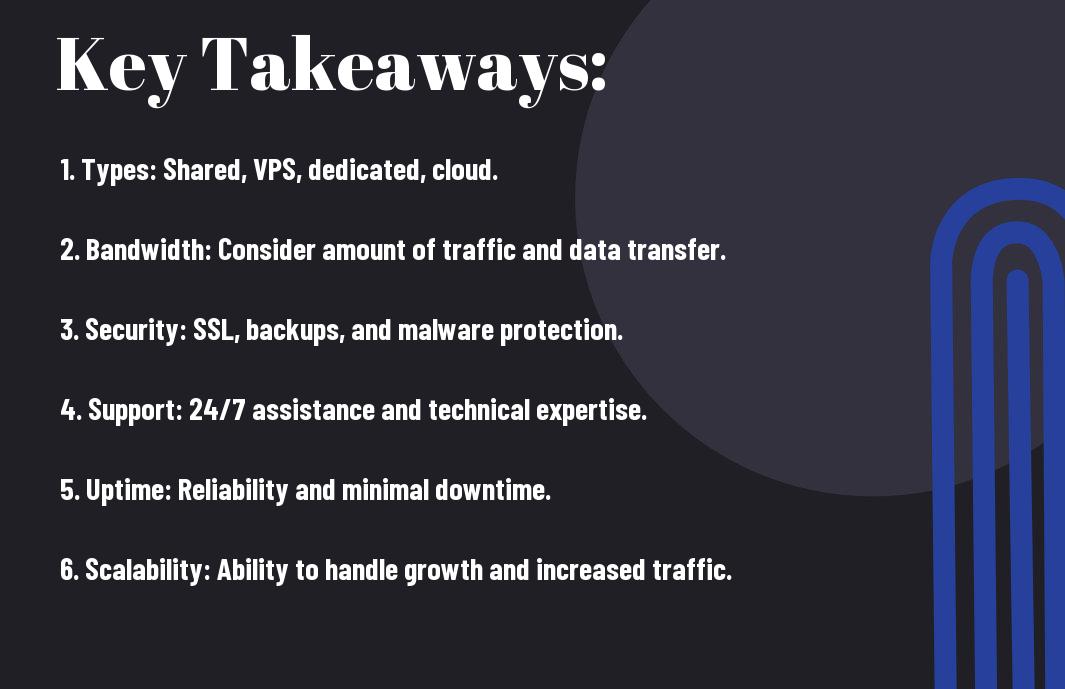Delving into the world of website hosting can be overwhelming, but it is an essential part of establishing and maintaining a successful online presence. When it comes to choosing a web hosting service for your website, there are a few critical factors to consider. Your website’s loading speed, security, and uptime are all heavily influenced by your choice of hosting provider. In this blog post, we will cover the most important aspects of website hosting, including the different types of hosting, key features to look for in a hosting provider, and common mistakes to avoid. By the end, you will have a better understanding of what to look for and what to avoid in the world of website hosting.
Types of Website Hosting
The types of website hosting available vary based on the size and needs of your website. It’s important to understand the differences between each before making a decision. You can find more detailed information in the The Ultimate Guide to Web Hosting.
| Shared Hosting | Virtual Private Server (VPS) Hosting |
| Dedicated Server Hosting | Cloud Hosting |
Shared Hosting
Shared hosting is the most affordable option, where your website is hosted on a server that’s also shared with other websites. This type of hosting is suitable for small businesses or personal websites with low to moderate traffic.
Virtual Private Server (VPS) Hosting
With VPS hosting, your website is still hosted on a shared server, but it’s virtually partitioned off from other sites. This gives you more control and resources, making it ideal for businesses experiencing growth and requiring more flexibility.
Dedicated Server Hosting
For websites that require a high level of security and performance, dedicated server hosting is the best option. You’ll have full control and exclusive use of the server, making it an ideal choice for large e-commerce sites or high-traffic websites.
Cloud Hosting
Cloud hosting is a flexible and scalable option where your website is hosted on a virtual server. It offers high uptime and the ability to handle sudden spikes in traffic, making it suitable for businesses with fluctuating website traffic.
After reviewing the types of website hosting, you can make an informed decision based on your specific needs.

Key Features of Web Hosting Services
To ensure that you choose the right web hosting service for your website, there are several key features that you should consider. Here are some of the most important factors to keep in mind:
- Uptime Guarantee: A reliable web hosting service should offer a minimum uptime guarantee of 99.9%, ensuring that your website is accessible to visitors at all times.
- Bandwidth and Storage: Look for a hosting plan that provides enough bandwidth and storage space to accommodate your website’s needs, while also allowing room for growth.
- Security Measures: Your chosen web hosting service should offer robust security features, including SSL certificates, regular backups, and malware protection.
- Customer Support: It’s crucial to have access to reliable customer support, whether through live chat, phone, or email, to address any technical issues or concerns.
Any web hosting service that you consider should offer these essential features to ensure the smooth operation and security of your website.
Uptime and Reliability
When it comes to web hosting, uptime and reliability are crucial to the success of your website. It is imperative that your site remains accessible to visitors at all times, so be sure to choose a hosting provider that guarantees a high uptime percentage, typically 99.9% or higher. Downtime can be detrimental to your online presence and can result in lost revenue, so prioritize a hosting provider that consistently delivers on their uptime promise.
Bandwidth and Storage
Bandwidth and storage are essential factors to consider when selecting a web hosting service. Bandwidth determines the amount of data that can be transferred to and from your website, while storage space dictates how much content, such as images, videos, and files, your website can store. It is crucial to choose a hosting plan with sufficient bandwidth and storage to support your website’s current needs and allow for future growth.
Security Measures
When choosing a web hosting service, security measures should be a top priority. Your chosen provider should offer robust security features, including SSL certificates, regular backups, and malware protection, to safeguard your website and its data from potential threats. Additionally, look for hosting plans that include security monitoring and proactive measures to prevent cyber attacks.
Customer Support
Reliable customer support is essential for addressing any technical issues or concerns that may arise with your web hosting service. Look for hosting providers that offer 24/7 customer support through various channels, such as live chat, phone, or email. Responsive and knowledgeable support can make a significant difference in resolving issues quickly and minimizing downtime for your website.
Choosing the Right Hosting Provider
Now that you understand the fundamentals of web hosting, it’s time to choose the right hosting provider for your website. To dive deeper into this topic, you can check out Everything You Need To Know About Web Hosting.
Evaluating Your Website Needs
When selecting a hosting provider, it’s crucial to evaluate your website’s specific needs. Consider factors such as the amount of traffic your site receives, the type of content you’ll be hosting, and any special features you require. For instance, if you anticipate a high volume of traffic, you may need a hosting plan that is more robust and scalable to accommodate your needs.
Comparing Hosting Plans and Prices
As you evaluate different hosting providers, you’ll come across various hosting plans and prices. It’s essential to carefully compare these options to find the best fit for your website. Consider factors such as storage space, bandwidth, uptime guarantees, and customer support. When comparing plans and prices, you can use the following table as a guide:
| Features | Considerations |
| Storage Space | Ensure you have enough storage for your website’s content and media. |
| Bandwidth | Consider the amount of traffic your site will receive and choose a plan with adequate bandwidth. |
| Uptime Guarantees | Look for providers that offer strong uptime guarantees to ensure your site is always accessible. |
| Customer Support | Choose a provider with responsive customer support to address any technical issues promptly. |
Understanding the Terms of Service
Before committing to a hosting provider, it’s crucial to thoroughly understand the terms of service. Pay close attention to details such as data security, backup procedures, and any limitations or restrictions on your website. Make sure you fully grasp the terms of service to avoid any potential issues or limitations in the future.
Managing Your Website Hosting
For many website owners, managing your website hosting can seem like a daunting task. However, with the right knowledge and tools, you can effectively manage your hosting and ensure your website runs smoothly.
Setting Up Your Website
When you first set up your website hosting, you will need to ensure that your domain is properly connected to your hosting server. This involves updating your domain’s DNS settings to point to your hosting provider. Additionally, you will need to upload your website files to the server using FTP or a file manager provided by your hosting company. It’s crucial to follow your hosting provider’s instructions carefully to avoid any potential issues.
Monitoring Performance and Traffic
Once your website is up and running, it’s important to regularly monitor its performance and traffic. You can use tools provided by your hosting company to track metrics such as website uptime, page load times, and visitor traffic. This information can help you identify any issues and make necessary improvements to your website. Regular monitoring ensures that your website is performing optimally and provides a positive user experience for your visitors.
Backing Up Your Data
Backing up your website’s data is essential in case of any unforeseen issues such as server crashes, hacking attempts, or accidental file deletions. Most hosting providers offer automated backup solutions, but it’s important to verify that your data is being backed up regularly and securely. Regular backups can save you from potentially catastrophic data loss and downtime.
Upgrading Your Hosting Plan
As your website grows, you may find that your current hosting plan no longer meets your needs. It’s important to assess your website’s traffic, storage, and performance requirements and consider upgrading your hosting plan accordingly. This may involve moving to a higher-tiered plan, a VPS, or a dedicated server. Upgrading your hosting plan can improve your website’s performance and user experience, ensuring that it can handle increased traffic and resource demands.

The Bottom Line on Website Hosting
The world of website hosting can be complex and overwhelming, but with the right knowledge, you can navigate it with confidence. By understanding the different types of hosting, the key features to look for, and the importance of uptime and support, you can make informed decisions that will benefit your website in the long run. Remember to carefully assess your specific needs and choose a hosting provider that aligns with those requirements. Keep in mind that your website’s hosting is a critical component of its success, so don’t rush the decision-making process. Educate yourself, ask questions, and make a choice that will support, protect, and optimize your online presence. Take the time to research and compare options, and don’t hesitate to reach out to experts to assist you if necessary. Your website deserves the best hosting, and with the right information, you can give it just that.
CATEGORY:Uncategorized

